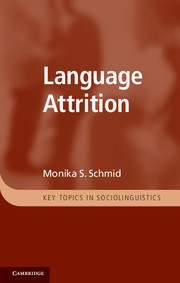Book contents
- Frontmatter
- Contents
- List of figures
- List of tables
- Preface
- Abbreviations
- 1 Introduction
- Part I Linguistic aspects of language attrition
- Part II Extralinguistic aspects of language attrition
- 6 Personal background factors
- 7 The role of L1 input and output
- 8 Attitudes and identities
- Part III Conducting research on language attrition – preliminary considerations
- Part IV Experimental designs for attrition research – the language attrition test battery
- Part V Coding and analysing the data
- 18 Conclusion
- Glossary
- Notes
- References
- Index
8 - Attitudes and identities
Published online by Cambridge University Press: 05 June 2012
- Frontmatter
- Contents
- List of figures
- List of tables
- Preface
- Abbreviations
- 1 Introduction
- Part I Linguistic aspects of language attrition
- Part II Extralinguistic aspects of language attrition
- 6 Personal background factors
- 7 The role of L1 input and output
- 8 Attitudes and identities
- Part III Conducting research on language attrition – preliminary considerations
- Part IV Experimental designs for attrition research – the language attrition test battery
- Part V Coding and analysing the data
- 18 Conclusion
- Glossary
- Notes
- References
- Index
Summary
In what way does the attitude a speaker has towards his or her L1 impact on language attrition? In this chapter, we will consider issues of identity and emotional affiliation, and how these factors shape and constrain the attritional process.
I mentioned above that migration is invariably a life-changing, and often a traumatic experience. Whatever the situation and circumstances which led to the start of life in a new country might have been, they will interact with the migrant's personality to bring about a particular outlook and a change in identity. A new start is always an opportunity to redefine oneself, although the range of options may be wider in some contexts than in others.
One limitation that almost all migrants experience to some degree is that migration makes you a foreigner, that is to say, an outsider. How a person responds to that, whether she wants to shed that status as quickly as possible and ‘blend in’, or whether the feeling of difference is accepted and embraced, can play an important role towards predicting how successful the acquisition of the new language will be. These factors can be equally important in predicting success or failure in language maintenance.
MIGRATION, IDENTITY AND BILINGUAL DEVELOPMENT
The circumstances of migration are as diverse and manifold as there are migrants. No two instances of migration will be the same – nor will the role of language. Language is one of the most important markers of identity which human beings have at their disposal.
- Type
- Chapter
- Information
- Language Attrition , pp. 96 - 106Publisher: Cambridge University PressPrint publication year: 2011

